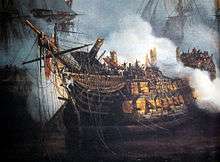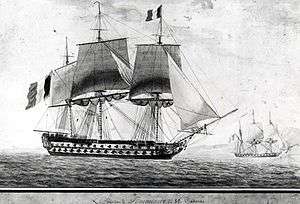French ship Bucentaure
Bucentaure was an 80-gun ship of the line of the French Navy, and the lead ship of her class. She was the flagship of Vice-Admiral Latouche Tréville, who died on board on 18 August 1804.

 Bucentaure | |
| History | |
|---|---|
| Namesake: | Bucentaur |
| Builder: | Arsenal de Toulon |
| Laid down: | 1802 |
| Launched: | 1803 |
| Commissioned: | 1804 |
| In service: | 1804–1805 |
| Out of service: | 1805 (wrecked on 23 October 1805) |
| Stricken: | 23 October 1805 |
| Captured: | 21 October 1805 (Battle of Trafalgar) – later recaptured from prize crew |
| Fate: | Wrecked on 23 October 1805 |
| General characteristics | |
| Class and type: | Bucentaure class ship of the line |
| Displacement: | 1 630 tonnes |
| Length: |
|
| Beam: | 14 m (46 ft) |
| Draught: | 6 m (20 ft) |
| Complement: | 840 |
| Armament: |
|
Bucentaure was named after the mighty Venetian ship Bucentaur which was destroyed by Napoleon I after the fall of the Republic of Venice in 1797. Vice-Admiral Villeneuve hoisted his flag on 6 November 1804. Bucentaure hosted the Franco-Spanish war council while sheltered from the British fleet at Cadiz. The vote was to remain in safe waters (a decision later overruled by Admiral Villeneuve) During the council, Spanish general Escaño complained that the atmospheric pressure was descending (a sign of approaching storms). French vice-admiral Magon famously retorted "the thing descending here is braveness". This offended Admiral Gravina and other Spanish officers who did not oppose later the imprudent order of taking to sea.
At the Battle of Trafalgar, on 21 October 1805, she was commanded by Captain Jean-Jacques Magendie. Admiral Nelson's HMS Victory, leading the weather column of the British fleet, broke the French line just astern of Bucentaure and just ahead of Redoutable. Victory raked her less-protected stern and the vessel lost 197 men and 85 were wounded (including Captain Magendie); Admiral Villeneuve was lucky to survive, but this effectively put Bucentaure out of most of the fight. After three hours of fighting, she surrendered to Captain James Atcherly of the Marines from HMS Conqueror.
Villeneuve is supposed to have asked to whom he was surrendering. On being told it was Captain Pellew, he replied, "There is no shame in surrendering to the gallant Sir Edward Pellew." When he was informed that the Conqueror's captain (Israel Pellew) was Sir Edward's brother, he said, "England is fortunate to have two such brothers."
In the following days, Bucentaure's crew rose up against the prize crew and recaptured the ship. However, she was wrecked in the gale-force storm of 23 October 1805.[1]
Bibliography
- Colomb, Philip Howard. The battle of Trafalgar.
W. Clowes & sons, limited, 1905. p. 18. Url - Corbett, By Sir Julian Stafford. The campaign of Trafalgar, Volume 2.
Longmans, Green, and co., 1919. p. 538. Url
References
- Corbett, 1905 pp.435 & 440
- Jean-Michel Roche, Dictionnaire des Bâtiments de la flotte de guerre française de Colbert à nos jours, tome I